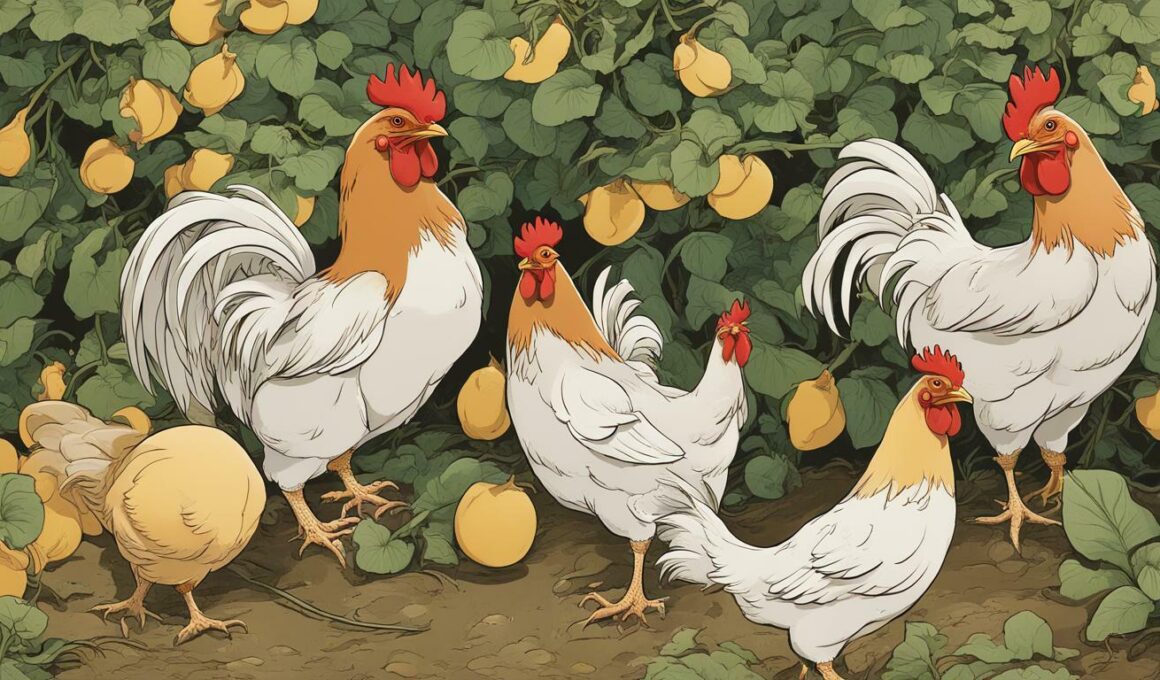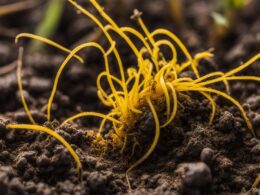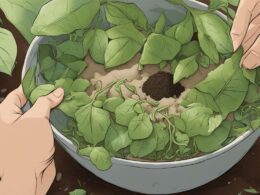As a responsible chicken owner, you want to ensure the safety and well-being of your feathered friends. This includes being aware of potential hazards, such as toxic plants that may harm your chickens. One plant that raises concern for chicken owners is the trumpet vine. But is it really harmful? Let’s explore.
Post Summary:- Understanding potential hazards is essential for the safety of your chickens.
- Trumpet vine, also known as Campsis radicans, is a plant of concern for poultry owners.
- This article will provide information about the plant, its toxicity, potential risks to chickens, safety measures, and safe plant alternatives.
Understanding Trumpet Vine (Campsis radicans)
If you’re a chicken owner, you may have heard conflicting information about whether trumpet vine (Campsis radicans) is harmful to your feathered friends. To make an informed decision about planting this popular vine in or near your chicken area, it’s important to understand its characteristics and potential risks.
Trumpet vine, also known as trumpet creeper or cow itch vine, is a deciduous woody vine native to the southeastern United States. It can grow up to 30 feet long and has clingy aerial roots that can attach to walls, trees, and structures.
| Appearance | Growth Habits | Location |
|---|---|---|
| The leaves are compound and pinnate with ovate leaflets that grow up to 5 inches long. | Trumpet vine can grow up to 13 feet in one season and can create dense thickets if not managed. | Trumpet vine is found primarily in the southeastern United States but can be found as far north as New York and as far west as Texas. |
Trumpet vine produces bright orange or red trumpet-shaped flowers that bloom in the summer and attract hummingbirds and bees. The vine also produces long, narrow seed pods that split open to release numerous seeds.
Knowing the characteristics of trumpet vine can help you identify it and understand its potential risks to your chickens. It’s important to remember that while the vine may not be poisonous to chickens, it can still pose a risk if consumed or if chickens come into contact with its sap or aerial roots.
Toxic Components of Trumpet Vine
Trumpet vine contains toxic components that can be harmful to chickens if ingested or if they come into contact with the plant.
The sap of the plant contains irritants that can cause skin irritation, inflammation, and dermatitis in chickens. The toxins in the sap can also cause gastrointestinal upset, including vomiting and diarrhea, if ingested by chickens.
In addition to the sap, other parts of the trumpet vine, such as the leaves, flowers, and seeds, are also toxic to chickens. These parts contain various toxins, such as glycosides and saponins, that can cause symptoms such as lethargy, weakness, and respiratory distress if consumed by chickens.
It is important to note that the toxicity of the trumpet vine may vary depending on the chicken’s age and size, as well as the amount of the plant consumed. Chickens that consume large amounts of trumpet vine or are exposed to it for prolonged periods of time may experience more severe symptoms.
Potential Risks for Chickens
While trumpet vine is a beautiful plant that can add a splash of color to your yard, it can also pose a potential risk to your chickens. If your feathered friends consume or come into contact with the plant, they may experience a range of symptoms that can be harmful to their health.
One of the primary concerns with trumpet vine is the toxic compounds it contains, such as calystegines and secoiridoids. These substances can cause digestive upset, including vomiting and diarrhea, as well as neurological symptoms like tremors and seizures.
What Are the Symptoms of Trumpet Vine Poisoning in Chickens?
If your chickens have ingested trumpet vine or come into contact with its sap, they may exhibit the following symptoms:
- Vomiting
- Diarrhea
- Loss of appetite
- Lethargy
- Tremors
- Seizures
If you observe any of these symptoms in your chickens, it’s important to take action immediately to prevent further harm. Contact your veterinarian for guidance on how to proceed.
How Can You Prevent Chickens from Being Exposed to Trumpet Vine?
The best way to protect your chickens from potential harm caused by trumpet vine is to prevent them from accessing the plant altogether. This can be achieved through a number of safety measures, including:
- Removing any trumpet vines growing in areas where your chickens are present
- Fencing off areas where trumpet vines are growing to prevent chicken access
- Monitoring chicken behavior and removing any chickens that appear to be consuming trumpet vine
By taking these steps, you can help ensure that your chickens remain safe and healthy while enjoying the great outdoors.
Safety Measures for Chickens
Now that you know the potential risks of trumpet vine for your chickens, it’s important to take safety measures to protect them. Here are some practical steps you can take:
- Remove or fence off trumpet vines from chicken areas: This is the most effective way to prevent your chickens from accessing trumpet vines. If you have trumpet vines growing near your chicken coop or run, consider removing them or fencing them off.
- Monitor chicken behavior: Even if you remove or fence off trumpet vines, your chickens may still find a way to access them (they are quite resourceful creatures!). Keep an eye on your chickens’ behavior and make sure they don’t have access to any trumpet vines.
- Consult a veterinarian: If you suspect your chickens have consumed or come into contact with trumpet vine, it’s best to consult a veterinarian immediately. They can help you determine the best course of action to keep your chickens safe and healthy.
Other Safety Tips for Chickens
While trumpet vine can be a potential hazard for chickens, there are other safety tips you can follow to ensure their overall well-being:
- Provide a clean and safe living environment: Make sure your chicken coop and run are clean and free from any hazardous materials or substances. Keep their food and water sources clean and change them regularly.
- Provide proper nutrition: Feed your chickens a well-balanced diet that meets their nutritional needs. Incorporate a variety of fruits and vegetables, as well as high-quality chicken feed.
- Encourage natural behaviors: Chickens love to scratch, peck, and dustbathe. Provide them with opportunities to engage in these natural behaviors, such as by adding sand or dirt to their run for dustbathing.
Is It Safe to Plant Trumpet Vine If I Have Chickens?
Before planting trumpet vine if you have chickens, it is vital to seek trumpet vine toxicity information. Some parts of the trumpet vine contain compounds that can be toxic to animals. Therefore, understanding the potential risks associated with this plant is crucial to ensure the safety and well-being of your chickens.
Safe Plants for Chickens
If you’re concerned about the potential risks of trumpet vine for your chickens, there are numerous safe plants you can grow in their areas instead. Here are some popular choices:
| Plant Name | Description |
|---|---|
| Marigolds | These bright and aromatic flowers are great for natural insect control and can also provide fresh greens for your chickens to peck on. |
| Herbs | Several common herbs, including basil, oregano, and parsley, are not only safe for chickens but also have beneficial properties for their health. |
| Sunflowers | Aside from their striking appearance, sunflowers can provide tasty and nutritious seeds for your chickens to enjoy. |
| Grasses | Many types of grasses, such as Bermuda grass or fescue, are safe for chickens and can be used to provide shade and a natural grazing area. |
| Squash | Not only are squash plants safe for chickens, but the fruits themselves can also make a tasty and healthy treat. |
Remember to research specific plants before introducing them to your chicken’s environment to ensure they are safe for consumption. Avoid using any plants that may be toxic to chickens, such as nightshade or oleander.
With a little effort and research, you can create a lush and vibrant chicken environment that is safe and enjoyable for your feathered friends.
Conclusion
Now that you know more about trumpet vine and its potential toxicity to chickens, it’s important to take the necessary steps to protect your feathered friends. Always be aware of the plants that are growing in and around your chicken areas and do your research on their potential hazards.
If you do have trumpet vine growing in your yard or garden, be sure to remove it or fence it off from your chickens to prevent accidental consumption or contact. If you suspect your chickens have ingested or come into contact with trumpet vine, watch for symptoms and seek veterinary care if necessary.
Remember, there are plenty of safe plants that you can grow in your chicken areas as alternatives to trumpet vine. Consider planting herbs, fruit trees, or other chicken-friendly plants that provide benefits such as shade, nutrition, and natural insect control.
Keep Your Chickens Safe and Healthy
By prioritizing your chickens’ safety and health, you can help ensure that they lead happy and fulfilling lives. Always be proactive in identifying potential hazards and take the necessary steps to prevent any harm. With a little bit of knowledge and effort, you can create a safe and nurturing environment for your beloved feathered friends.
FAQ
Q: Is Trumpet Vine Poisonous To Chickens?
A: Trumpet vine can be toxic to chickens if ingested or if they come into contact with the sap. It is important to be aware of the potential risks and take necessary precautions to protect your chickens.
Q: What is Trumpet Vine (Campsis radicans)?
A: Trumpet vine, scientifically known as Campsis radicans, is a flowering vine native to North America. It is known for its vibrant trumpet-shaped flowers and can commonly be found growing along fences, walls, and other structures.
Q: What are the toxic components of Trumpet Vine?
A: Trumpet vine contains toxic compounds such as resins, glycosides, and tannins. Ingesting these components can lead to gastrointestinal distress and other symptoms in chickens.
Q: What are the potential risks for chickens?
A: Chickens that consume or come into contact with trumpet vine may experience symptoms such as vomiting, diarrhea, loss of appetite, and irritation of the skin. In severe cases, it can even be fatal.
Q: What safety measures can I take to protect my chickens from trumpet vine?
A: To ensure the safety of your chickens, it is best to remove or fence off any trumpet vines from their living area. Regularly monitor your chickens for any signs of illness or distress and consult a veterinarian if necessary.
Q: Are there any safe plants for chickens that I can consider?
A: Yes! There are several safe plants that can be grown in chicken areas as alternatives to trumpet vine. Some popular choices include sunflowers, marigolds, basil, and lavender.
Q: What is the conclusion?
A: It is important to be aware of potential plant hazards for chickens, such as trumpet vine, and take necessary precautions to ensure their safety. By implementing safety measures and providing safe plant alternatives, you can prioritize the well-being of your feathered friends.









